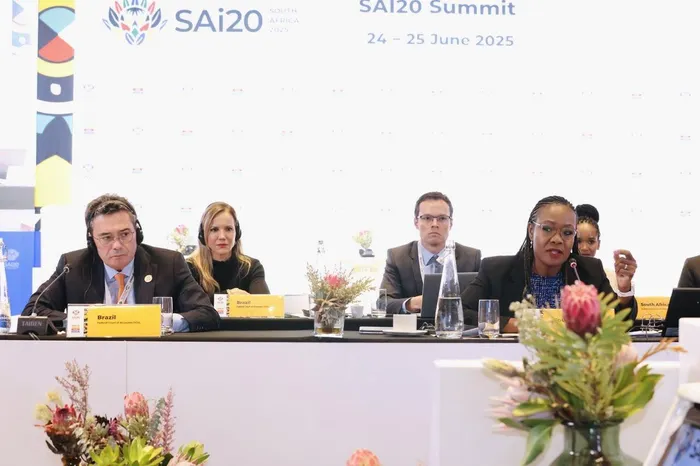
Auditor General Tsakani Maluleke speaking duiring the SAI20 Supreme Auditors Summit 2025.
Image: Supplied
The Auditor General of South Africa (AGSA), Tsakani Maluleke has underscored the significance of the country’s distinctive mandate to audit all public institutions annually.
This capacity, not commonly shared by her international counterparts, is increasingly admired globally as a model for promoting accountability and transparency in public finance.
Addressing the media on the Supreme Audit Institutions of the G20 (SAI20) in Johannesburg, Maluleke expressed concern that the unique perspective of the AGSA often goes unnoticed.
"Not every AG sees all the states in the way AGSA does. Sometimes I fear that gets lost when we issue a general report which gives you a sense of not just on municipality but what is happening across the country," she said.
"It is the perspective that is unique to AGSA in this country but it also a perspective that is becoming more and more aspirational for our peers across the globe."
This perspective, according to Maluleke, is vital as it provides citizens, administrators, parliamentarians, councils, and municipal executives with crucial information to inform decision-making processes.
"One of the things unique about SAI and team AGSA is that the Constitution requires that the AG audits every public institution every single year. The public audit act also provides that the AG must look at financials, performance information, compliance and internal controls," Maluleke said.
She said SAI20 had come up with a good series of conversations that have culminated in the consesus-driven Communique.
The SAI20 summit aims to explore developmental themes such as unlocking public infrastructure funding to foster equality and enhance citizens' quality of life.
Another key focus will be on bridging the skills gap to prepare a future-ready workforce, signalling a collaborative approach to economic growth that prioritises sustainability.
Maluleke said SAI20 sets out the service of what the Supreme Audit Institutions are going to start doing differently in countries as they audit independently, the type of focus areas they will choose, the type of perspectives they will focus on and how they will engage with that work.
This will also include recommendations for implementation for AGs.
"The second, perhaps there are things we can start to recommend to governments that will will help them to start making gains in the two things," Maluleke said.
Addressing concerns regarding municipalities' preparedness for the upcoming G20 meeting, especially given that only 41 of 257 municipalities achieved clean audits, Maluleke stressed the importance of focusing on infrastructure projects.
"The work as team AGSA has taught us what goes wrong, how to frame our recommendations to governments, how to resource our teams," Maluleke said.
"Team AGSA is no longer resourced by people who are bean counters but supplementing to include engineers and quantity surveyors so that the work we do provides credible insight and is impactful. We were able to bring lessons such as that to a room full of other AGs."
While acknowledging that the recommendations made by AGs and through SAi20 are not binding on sovereign nations, Maluleke affirmed the importance of ensuring that these suggestions are compelling and backed by credible information.
"We will also be sharing the leaders of the G20 so that as heads of their own respective governments and as a collective, they can start to hear the voice of AGs, appreciate the value of AGs as enabling partners in the journey of development," Maluleke said.
She said the objectives of the SAI20 were relevant both in sustainable development goals or about Agenda 2063, and all of those aspirations will be met if the AGs prioritise optimal spend on human capital development and on leveraging of investments in infrastructure.
BUSINESS REPORT